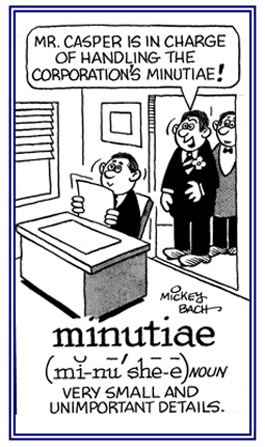Latin Proverbs, Mottoes, Phrases, and Words: Group M
(classical-language maxims, slogans, adages, proverbs, and words of wisdom that can still capture our modern imagination)
Expressions of general truths: Latin to English maxims, proverbs, and mottoes
Word entries are from Latin unless otherwise indicated.
A motto of Ryerson Polytechnical Institutue, Toronto, Ontario, Canada.
This is the Latin form that comes from ancient Greek merismos and the verb form, merisein, "to divide" from meros, "part" and is defined as a type of synecdoche [a figure of speech] in which a totality is expressed by two contrasting parts; such as, "high and low, rich and poor, good and bad, old and young, thick and thin, near and far".
A synecdoche [si NEK duh kee] (Greek > Latin) is defined as, "a figure of speech used in rhetoric in which a part is used for a whole or vice versa"; literally, "a receiving together or jointly". Examples include, "bread for food, the army for a soldier, copper for a penny, forty hired hands instead of forty paid workmen", and "the white cliffs of Dover for England". In addition, the whole may stand for the part; as with, "The fleet hit town" for "The sailors of the fleet hit town".
Another form is merismatic, meaning capable of active division (of cells).
Motto of Hunter College, USA.
A motto of St. Joseph's Seminary, Yonkers, New York, USA.
"The miliarium generally gave the distance from the town where the road originated, the name and titles of the emperor under whose auspices the road was built, sometimes the names of those who built it [Legio III Augusta build this road], and sometimes the date when it was finished."
"In addition, the miliarium generally specified whether the road was repaired (ristituit) or built at the emperor's own expense (pecunia sua) and whether it was a gravel road (via glarea) or a paved road (via stata)."
"Thousands of miliaria have been removed from the roads; many are found to have been used in building houses, churches, and foundations, while a few of the others have been moved to museums."
"In addition to milestones or miliaria, there were the itineraria to guide tourists, military commanders and commercial travelers over the Roman roads. The itineraria were schematic maps with symbols to indicate such geographical features as mountains, rivers, and lakes, as well as way-stops, official night quarters (mansiones), military bases (castra praetoriana), and post-houses, (mutationes) where horses were kept for use. The itineraria also gave the distances between points on the road."

Go to this Word A Day Revisited Index
so you can see more of Mickey Bach's cartoons.
Used to introduce the announcement of something the speaker, genuinely or ironically, considers to be amazing.
Another version is "Believe it or not." This statement by Vergil is used when anyone wishes to express astonishment while recounting an event of overwhelming significance, accomplishment, or irony.
A companion phrase for mirabile dictu and is equivalent to the current English statement, "An incredible sight."
2. Etymology: from Latin, miscere, "to mix"; an imperative form in grammar for a verb which expresses a command, a request, or strong advice.
Miscellaneous is made up of many different things or kinds of things that have no necessary connection with each other. Note its similarity to some aspects of et cetera especially since miscellaneous is also made up of a variety of parts or ingredients and is concerned with diverse subjects or aspects; as well as, mixed, varied, and assorted items.
Motto of German Emperor Rupprecht of Palatinate (1400-1410).
![]() Units of mottoes and proverbs listed by groups: A to X.
Units of mottoes and proverbs listed by groups: A to X.


